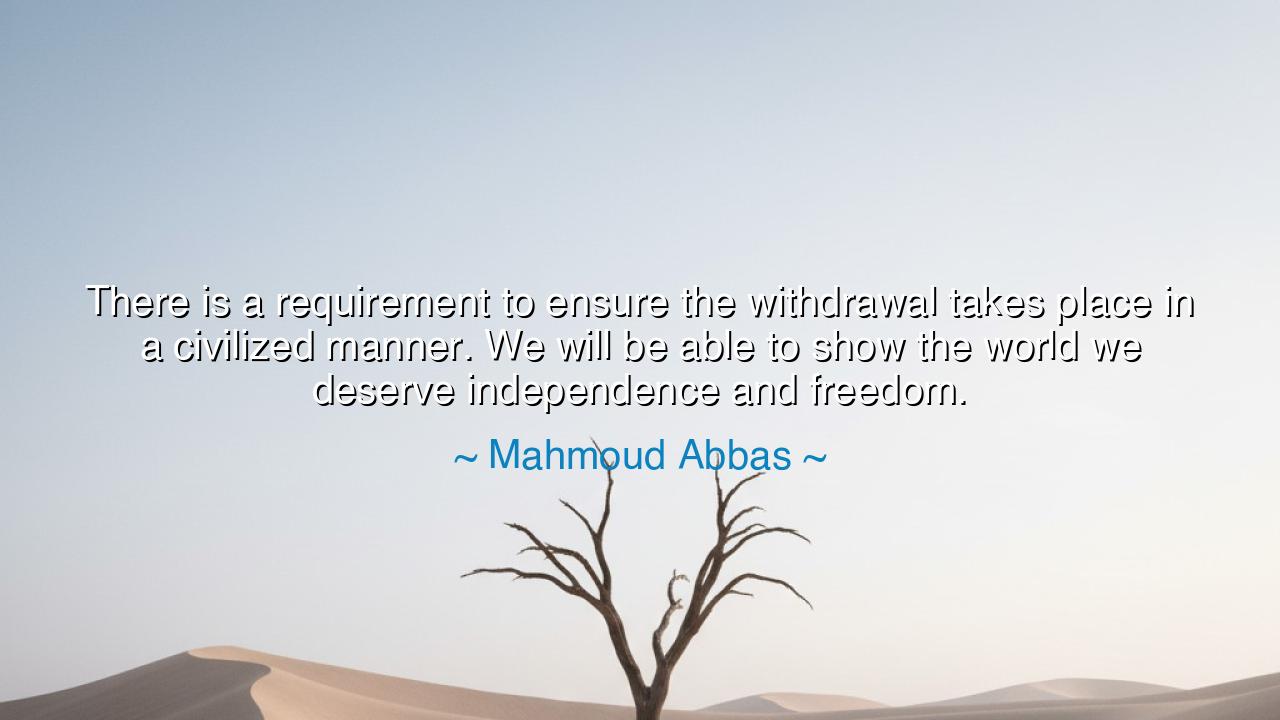
There is a requirement to ensure the withdrawal takes place in a
There is a requirement to ensure the withdrawal takes place in a civilized manner. We will be able to show the world we deserve independence and freedom.






When Mahmoud Abbas said, “There is a requirement to ensure the withdrawal takes place in a civilized manner. We will be able to show the world we deserve independence and freedom,” he spoke not only as a political leader, but as the voice of a people standing at the edge of destiny. His words were born from the long and painful journey of the Palestinian struggle for statehood, uttered during a time when hopes for peace and sovereignty were fragile yet alive. But beyond the specific moment, Abbas’s statement holds a wisdom that transcends borders and generations — the truth that freedom is not only won by resistance, but proven through restraint.
In this quote, Abbas was addressing the Israeli withdrawal from Gaza in 2005, a historic turning point in the region’s conflict. The world watched as the occupation forces prepared to leave and a people long denied their autonomy stood ready to govern themselves. Yet Abbas, understanding the eyes of the world upon them, did not speak of triumph or vengeance. Instead, he spoke of discipline, dignity, and civilization. For he knew that independence is not merely the absence of another’s power — it is the presence of one’s own maturity. Freedom without order is chaos, and independence without virtue is but another form of captivity.
The ancients knew this truth well. After the Persian Wars, when the Greeks threw off the yoke of empire, their victory was not secured by the sword alone but by the creation of law, culture, and reason. Athens rose not because it conquered, but because it governed itself with wisdom. Likewise, Abbas’s words echo the eternal lesson that the proof of a people’s readiness for freedom lies not in how they fight their oppressors, but in how they rule themselves once the chains are gone. It is easy to win liberation through passion; it is far harder to sustain liberty through discipline.
History is filled with those who won freedom but lost it again through anger, division, or pride. When colonial empires fell in the twentieth century, many nations were thrust into self-rule, yet some fell quickly into tyranny or corruption because they mistook independence for license. Abbas’s call for a “civilized manner” was not weakness — it was wisdom. He understood that true sovereignty must be built upon self-control, respect for life, and justice. The world would not grant legitimacy to a people that descended into chaos; only through the quiet power of order could they claim their rightful place among nations.
The moral force of this quote lies in its humility. It does not demand freedom as an entitlement but seeks to earn it through example. This is the same spirit that guided leaders like Mahatma Gandhi, who taught that independence is hollow if achieved through hatred. When India gained its freedom, Gandhi wept, for he knew that political liberty must be matched by moral strength. Similarly, Abbas’s appeal was a reminder that the struggle for independence is not only external — it is a battle within the human heart, between vengeance and virtue.
In a broader sense, Abbas’s words are not for one people alone; they are a mirror held up to all who yearn to be free — in nations, in movements, even in individual lives. Every person who rises from oppression faces this test: can you wield freedom without destroying yourself? Can you use power with dignity, and restraint with courage? The world may celebrate rebellion, but it is character that sustains liberation. As Abbas said, to “show the world we deserve independence and freedom” means to act in a way that honors the very ideals for which freedom was sought.
So, my children of the future, remember this: freedom is not a gift but a discipline. It is not granted by the powerful; it is earned by the just. When the time comes for you to stand on your own, do so with dignity. Let your actions reflect not the wounds of the past, but the wisdom born from them. Rule yourselves with compassion, walk with restraint, and let your conduct be your declaration to the world. For it is not the gaining of independence that proves your worth — it is the manner in which you live it.






AAdministratorAdministrator
Welcome, honored guests. Please leave a comment, we will respond soon